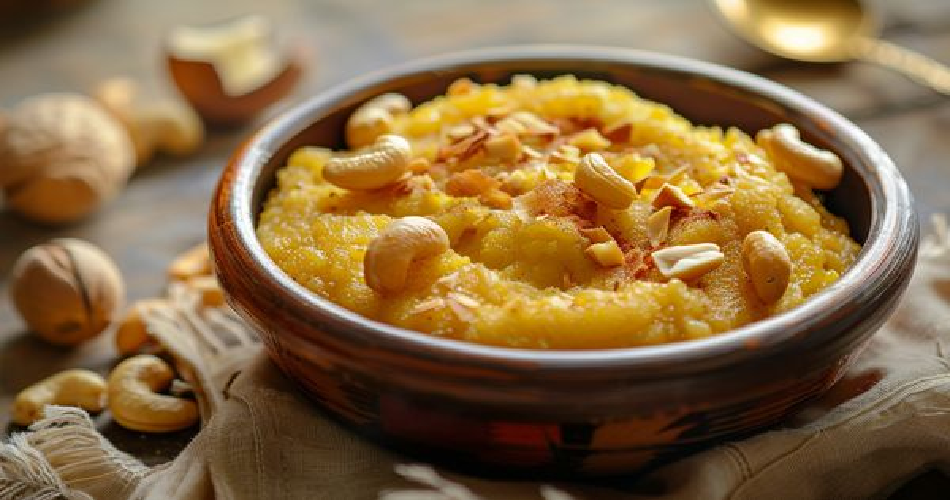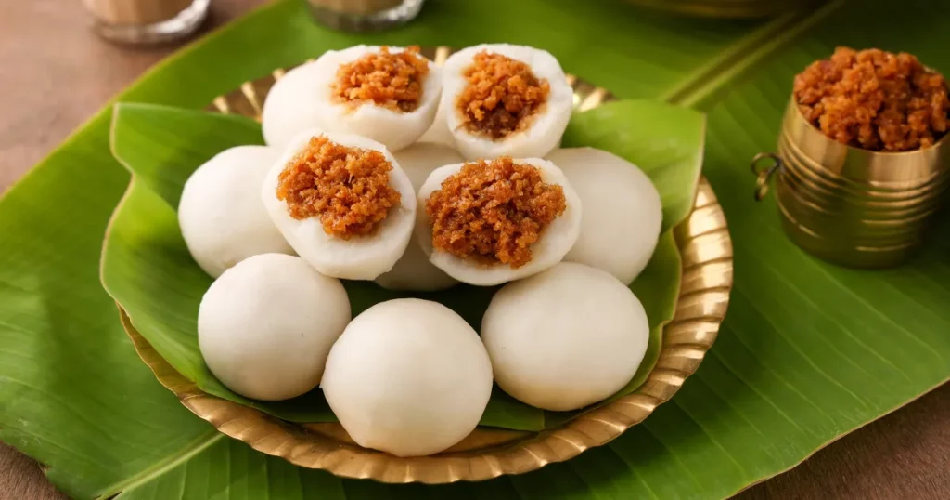
Thanjavur (Tanjore) sits in the heart of the Kaveri Delta, earning it the title “The Rice Bowl of Tamil Nadu.” Its cuisine is a unique blend of traditional Tamil Brahmin, Mukkulathor, and the rich Thanjavur Maratha royal styles, offering both authentic vegetarian and unique non-vegetarian flavors. Here is a comprehensive guide to the top 10 foods you must try in Thanjavur:
1. Ashoka Halwa (Thiruvaiyaru Ashoka)
- What It Is: A signature, rich, and celebratory dessert.
- Main Ingredients: Moong Dal (split yellow lentils), wheat flour, generous ghee, and sugar.
- Key Feature: Has a soft, melting, semi-liquid texture and a distinctive nutty flavor.
- Significance: A compulsory sweet for festivals, weddings, and special occasions.
2. Thanjavur Special Sambar
- What It Is: A quintessential South Indian lentil and vegetable stew.
- Unique Twist: Thanjavur Sambar is generally thicker and uses a greater emphasis on fresh, roasted spices.
- Heritage: Legend suggests it was accidentally invented in the Thanjavur Maratha royal kitchens.
- Taste: Perfectly balanced (tangy, sweet, and savory).
- Serving: Essential accompaniment to Idli, Dosa, Vada, and Pongal.
3. Arisi Paruppu Sadam
- What It Is: A simple, wholesome, and comforting one-pot rice and lentil dish.
- Ingredients: Rice and toor dal cooked together with simple tempering (ghee, mustard seeds, cumin).
- Taste: Mild, earthy, and highly nutritious comfort food.
- Serving: Best enjoyed with extra ghee and a side of crisp Appalam (papad) or spicy Chutney (Thogayal).
4. Thavala Adai (Tanjore Style Adai)
- What It Is: A thick, crispy pancake.
- Ingredients: Made from a mixed batter of rice and several different lentils.
- Unique Style: It is thicker than a Dosa and traditionally shallow-fried until crispy outside and soft inside.
- Serving: Commonly served with freshly grated Coconut Chutney or a flavorful thick stew called Gothsu.
5. Seeraga Samba Mutton Biryani
- What It Is: A highly aromatic and delicate Biryani.
- Key Ingredient: Uses Seeraga Samba (a fragrant, short-grain rice) instead of Basmati.
- Taste Profile: Milder and less spicy than Biryanis from other regions; highly flavorful as the small grains absorb the masala perfectly.
- Serving: Usually served with Onion Raita and spicy Brinjal (Eggplant) Gravy.
6. Kumbakonam Degree Filter Coffee
- What It Is: Traditional filter coffee, a staple across the region.
- The “Degree”: Denotes the purest and thickest extract of the first drip of decoction.
- Experience: Served piping hot in a traditional Davara-Tumbler set.
- Ritual: Poured back and forth to cool it and create a light froth.
7. Murungakkai Sambar (Drumstick Sambar)
- What It Is: A local variation of Sambar.
- Key Ingredient: Murungakkai (Drumstick), which infuses the stew with its earthy, aromatic flavor.
- Style: Often includes fresh ground spices and coconut paste, common in Thanjavur cuisine.
- Serving: Eaten as a primary side dish with rice and various vegetable curries.
8. Vada Curry
- What It Is: A beloved, thick curry.
- Preparation: Made using crumbled, deep-fried lentil fritters (vada) cooked in a rich gravy.
- Gravy Base: Aromatic gravy with tomatoes, onions, ground spices, and often coconut paste and fennel seeds for creaminess.
- Serving: A popular breakfast or tiffin accompaniment, typically paired with Idli, Dosa, or Parotta.
9. Paanagam (Traditional Summer Cooler)
- What It Is: A traditional, non-alcoholic energy-boosting beverage.
- Ingredients: Simple base of jaggery, water, lemon juice, flavored with dry ginger powder and cardamom.
- Purpose: An instant energy booster and a traditional cooling drink.
- Taste Profile: Sweet, tangy, and subtly spicy.

10. Kozhukattai (Steamed Rice Dumplings)
- What It Is: The Tamil version of a steamed dumpling.
- Shell: Made from a soft, kneaded rice flour outer shell.
- Sweet Stuffing: Mixture of grated coconut and jaggery.
- Savory Stuffing: Spiced mixture of lentils (dal).
- Significance: Traditionally prepared during the Ganesh Chaturthi festival.
Where to Eat in Thanjavur?
For an authentic experience, consider these types of establishments:
- Traditional Veg Meals: Look for legacy vegetarian restaurants like Sree Ariya Bhavan or Vasantha Bhavan for a complete South Indian Thali (meal) served on a banana leaf.
- Biryani: Local, non-chain messes and restaurants are the best bet for authentic Seeraga Samba Mutton Biryani.
- Tiffin/Breakfast: Any local Mess or tiffin center will serve the best Dosa, Idli, Pongal, and Vada Curry.
- Sweets: Look for local bakeries or sweet shops for Ashoka Halwa and other traditional sweets like Akkaravadisal.